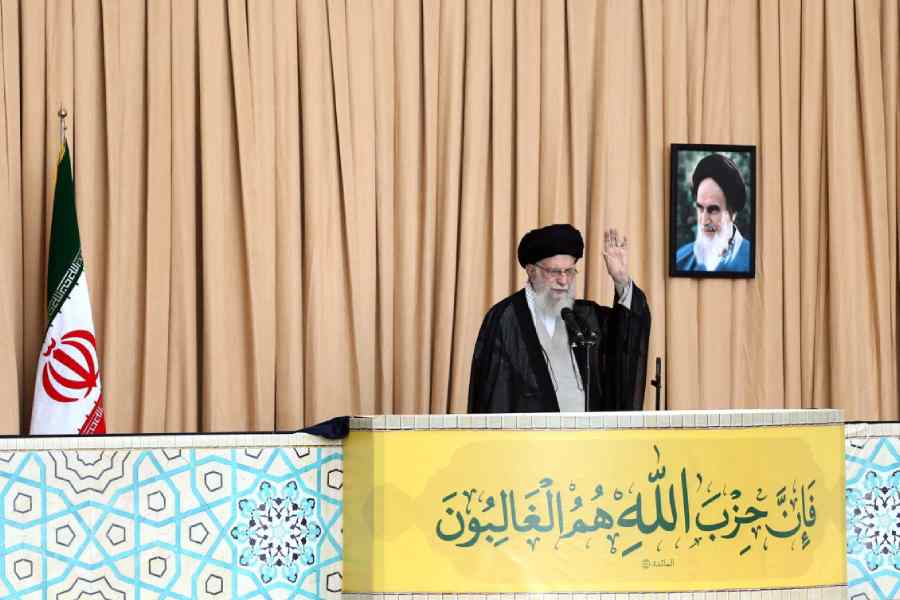Iran’s supreme leader warned on Friday of further strikes against Israel, using a rare sermon in Tehran to express solidarity with Palestinians and Hezbollah, as Israel kept up punishing attacks against Tehran’s proxy forces in West Asia.
The address from the supreme leader, Ayatollah Ali Khamenei, came hours after Israeli carried out deadly attacks in Lebanon and the occupied West Bank. The Israeli strikes, including against top Hezbollah leaders in Beirut, and Iran’s own attacks have added to fears of a full-blown war between the two.
Around midnight, Israeli warplanes carried out strikes in an area just south of Beirut where Israeli officials said senior leaders of Hezbollah, the Lebanese militant group, were believed to be meeting in an underground bunker. A series of huge explosions rocked the densely populated area known as the Dahiya, causing shock waves that were felt across the capital.
The strike targeted Hashem Safieddine, a cousin and the presumed successor of Hassan Nasrallah, the assassinated Hezbollah leader, according to three Israeli officials. It was not clear whether he had been killed, though Israel’s military on Friday claimed it had killed another senior Hezbollah commander in a strike in the Beirut area.
As Iran’s foreign minister landed in Beirut for meetings, Nasrallah was honoured by Khamenei, who led the Friday Prayer in Tehran as he does only in extraordinary circumstances. Switching to Arabic to address Palestinians and the people of Lebanon, he said that Iran shares an enemy with them — a reference to Israel.
He defended Iran’s launch this week of nearly 200 missiles at Israel as “completely legal and legitimate”, and warned that more strikes could come “in the future”.
Air-raid sirens sounded on Friday across much of northern Israel as Hezbollah continued to fire rockets at the region. Israel’s military said around 100 rockets had been launched as of early afternoon, but the authorities did not immediately report casualties or significant damage.
Khamenei’s sermon came during a memorial service in Tehran for Nasrallah, who was one of the Ayatollah’s closest allies and friends. He was killed in an Israeli attack last week. Many people had waited for hours inside the venue ahead of Ayatollah Khamenei’s address, carrying Palestinian flags along with the yellow flags of Hezbollah and posters of Nasrallah.
“What our armed forces did was the least punishment they could do” against Israel, he said, adding that “what is logical and rational will be done at the right time and will be done again in the future if necessary”.
On Tuesday, Iran fired 200 missiles at Israel in retaliation for Nasrallah’s death, as well as for the recent killings of Hamas’s political leader, Ismail Haniyeh, and an Iranian commander, Iran’s Islamic Revolutionary Guards Corps said.
In a series of attacks, Israel has been diminishing the military abilities of and dismantling the leadership of Hezbollah, a militia group backed by Iran and based in Lebanon. On Thursday night around midnight, Israel launched an intense barrage of airstrikes in a neighbourhood south of Beirut in an effort to target Hashem Safieddine, Nasrallah’s presumed successor, according to three Israeli officials.
It is rare for Ayatollah Khamenei to lead Friday Prayer and deliver the sermon, typically doing so under extraordinary circumstances related to Iran’s national security. The last time was in 2020 after the US killed Iran’s top general, Maj. Gen. Qassim Suleimani, in Iraq. Iran retaliated by firing ballistic missiles at an American base in Iraq.
Ayatollah Khamenei’s appearance in person, despite security concerns, signalled the significance of the moment as anxiety mounts that Israel and Iran appear prepared to risk direct conflict.
Large crowds of men and women waited in lines on Friday that began forming outside the compound as early as 6am, several hours before the event started, videos published by Iranian news media showed.
Ayatollah Khamenei said earlier in the week in televised comments that he was in mourning for Nasrallah, but that the grief would fuel Iran’s resolve to fight Israel.
Plans for an official funeral for Nasrallah have not been announced. It is not clear whether it is feasible for Hezbollah and what remains of its leadership to gather publicly, given Israel’s attacks.










